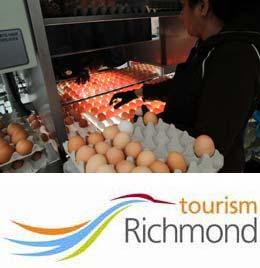Organic egg farm thriving in Richmond

By Lindsay Anderson
Special to The Post
Which came first, the chicken or the dumpling?
On a recent visit to a local farm, I saw it was the chicken that came first.
2000 of them in fact, at Rabbit River Farms in northeast Richmond.
Founded in 1994, the Easterbrooks were the first commercial producers of organic eggs in all of Canada, and are 4th and 5th generation farmers in Richmond.
They are literal pioneers when it comes to cage free and certified organic egg production, and I had the pleasure of touring their farm. This included a symphony of the collective high-pitched shriek of 2000 chickens, and meeting Blue, the friendliest collie there ever was.
Rabbit River Farms ships thousands of eggs daily to private shops, grocery store chains, and restaurants all across the lower mainland, and as far as Manitoba. They were the first Canadian producers to receive SPCA farm certification ensuring humane treatment of their animals, and Steve Easterbrook himself wrote the certification standards for organic egg production in Canada.
See? Pioneers!
One half of their huge facility is occupied by the chickens themselves – thousands of red and white dames strutting around, clucking, taking sand baths, and grooming themselves constantly (this being a sure sign of a healthy flock, Steve told me).
On average, they each produce one egg per day, all of which make their way into the packaging facility on a very gentle conveyer belt. Like tipsy little soldiers, they’re filed through a washing machine, a dryer, a ‘candler,’ which allows for cracks and imperfections to be spotted, and then packaged.
Eggs with aesthetically displeasing (but uncracked) shells are sold wholesale to restaurants and bakeries – like Bell’s Bake Shop! - and the eggs with cracked, but intact, shells are donated to animal rescue shelters as feed.
Steve showed me an ‘egg yolk colour swatch’ used to analyze yolks, which delighted me to no end – I want one of these when I someday have a kitchen of my own to decorate. When I put a photo of it on Instagram, Dana commented and asked for “two #14’s poached with hollandaise, please.”
My favourite machine of the day was one that sorts eggs according to their weight, the smallest being “Peewee” – yes, that’s the official term – and the largest being “Super Jumbo.” The eggs are sent, single-file, onto a conveyer belt that weighs them, and as various sizes are detected, a plastic ‘flipper’ bumps them into that correct section.
It’s so smart. I could have watched it for an hour.
Once they’re sorted, into their boxes they go, then the eggs are stored in a cooler before getting shipped off to customers.
After I’d asked about 1001 questions about eggs, machines, and yolk colours, we went outside and Steve let the chickens out to pasture. What a sight!
They are a seriously noisy bunch. Unless the weather is horrendous, they’re usually let out each day around 11AM, and stay in the pasture until sundown.
These are some lucky chickens.
Steve told me that when they started in the early 90’s, less than a quarter of one percent of chickens in BC were cage-free, and that number is now up to 20%!
Very impressive. If you’d like to support the Easterbrooks’ efforts to produce ethically-raised and delicious eggs, you can do so by buying some!
A huge thank you to Steve, his family, and his staff for welcoming me yesterday to their farm, and of course, thank you to the chickens, who have provided me with so many scrumptious breakfasts in my life.
I salute you.
For more information on Rabbit River eggs and their organic farming practices, go to www.rabbitriverfarms.com.
Lindsay Anderson is dining out at 365 Richmond eateries in 365 days for Tourism Richmond. The Asian Pacific Post is featuring excerpts from her blog each week. See www.365daysofdining.com for Anderson’s blog.
Leave a comment









